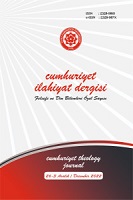İmam-Hatip Ortaokulu ve Ortaokul Din Kültürü ve Ahlak Bilgisi Derslerinde İnanç Öğretimi Üzerine Bir İnceleme
An Analysis on the Belief Teaching in Imam-Hatip Secondary School and Secondary School Religious Culture and Moral Knowledge Lessons
Author(s): Süleyman Gümüş, Mikail İPEKSubject(s): Ethics / Practical Philosophy, Islam studies, School education, Sociology of Culture, Sociology of Education, Sociology of Religion
Published by: Cumhuriyet Üniversitesi İlahyat Fakültesi
Keywords: Religious Education; Kalam; Belief; Belief Education; Religious Culture and Moral Knowledge Lesson;
Summary/Abstract: In this study, secondary school DKAB (Religious Culture and Moral Knowledge) lesson’s belief learning domain has been examined structurally. In this context, the basic principles of belief have been discussed according to Māturīdīsm, Ash'arism, Mutazilite and in places according to Shia. The common points and different aspects of the ideas in the domain of belief of these schools have been examined in a comparative way. Subjects such as the attribute of taqwin/creation, which is the main discussion between Māturīdīsm and Ashʿarism, whether Allah can be known by reason, whether the good and the evil are determined by reason or nass/verses are the examples. Additionally existance of the immutable attributes and that whether they are eternal or not, that whether ru’yatullah/seeing God is possible or not and the conditions of the afterlife which have been points of discussion between Mutazilite and Ahl es-Sunnah have been handled in the article. Surely these are matters of extensive discussion; this study evaluated these topics in the pedagogical context of the belief learning domain of the DKAB lesson. Firstly the theological background of the belief learning domain of DKAB lesson has been handled. Then learning outcomes which are the first elements of the curriculum have been classified. And thirdly the text books which are the second dimension of the curriculum have been analyzed. The method of the study is document analysis. Belief is the first of the learning domains designated as worship, morality, Prophet Muhammad and culture, and it is also of great importance because it is the basis of other learning domains. Belief learning domain is in the interest of curriculum designers in terms of having some pedagogical features but it must also be in harmony with theological acceptances as it is one of the basic components of religiosity. The theological background is also directly related to the political and legal context of the lesson, such as doctriner and non-confessional status. Because when various interpretations of religion do not have common points or when the common points are weak, the non-confessional feature will always be a controversial matter. In theological texts God has been described as essential, the almighty, the omniscient and one who intervenes in the history. Discussions between Kalam schools and philosophical schools about God's attributes, or the discussions within the Kalam schools are very important in terms of reflecting God-universe-human relationship. One of the most important problems in this issue is that the conception of God is not decisive, and that the conception of matter and human must be compatible with the conception of God. Developing a theology in the context of God's attributes, excluding matter and human conceptions leads to an over-abstraction of the theological background. Moreover, changes in the conception of matter and human will harm the conception of God, and the contribution of religious education to those who searching for meaning will decrease. The fact that the faith principles of Islamic religion do not vary depending on the sects strengthens the status of non-confessional religous education. In addition, an essential God conceptualization facilitates the management of people their lives. For believers, life has a purpose and it is a preparation for the afterlife. Furthermore in the context of cultural knowledge, gaining in-depth knowledge is a remarkable support for social life. On the other hand, the achievements in the lesson curriculum are at the first levels in terms of taxonomy and this shows that the lesson does not support high level learning and identity formation. Considering the speed and severity of the transformation in social life, it is necessary to provide some qualities that will support the construction of self and personality of those who take religious education. However, the low level of objectives of the curriculum and the one-dimensionality of Bloom's taxonomy used in the curriculum have been an unsolved problem for a long time. This points out the importance of developing a curriculum of religious education, taking into account the theological background and the individual and social dimensions of human beings. On the other hand, it can be thought that there are some problems in the establishment of the relationship between God-universehuman in the textbooks. Although the content is suitable for personal God representation and gives prominence to causality tought, when it comes to the idea of order of the universe, it contradicts with personal God representation and moral development. When the idea of order is over-objectivized in the textbooks, it becomes unclear how God intervenes in the universe. So, it remains suspended that the learners how make sense of events and their actions.
Journal: Cumhuriyet İlahiyat Dergisi
- Issue Year: 26/2022
- Issue No: 3
- Page Range: 939-953
- Page Count: 15
- Language: Turkish

